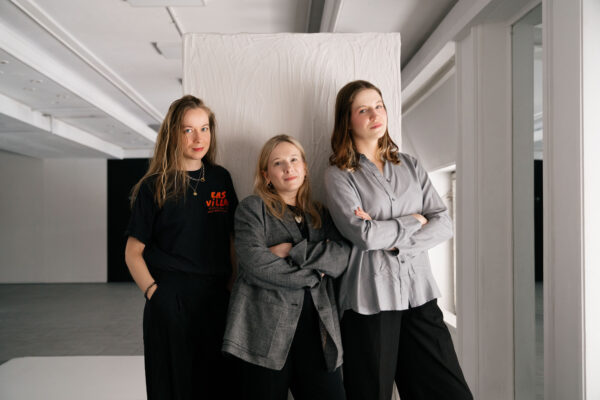Maria Halber / Aleksandra Kamińska / Agata Wnuk

The pretext for participating in the residency is the desire to publish a second book of poetry by acclaimed and award-winning author Anouk Herman, with the working title Silesian Gothic. The book would be the sixth publication on the intersection of poetry and prose by our independent queer mini-publishing company, Girls and Queers to the Front. As part of the residency, we want to use the work on Anouk Herman’s poetry collection as an opportunity to develop a sustainable and viable operation strategy at a time when the scope of our endeavours continues to grow and we are struggling with a lack of formal preparation for, among other things, publishing. This applies to coordinating the work on the book, setting a realistic roadmap, editorial work, working with authors and artists to design the book’s layout, and an appropriate promotional strategy. As an independent initiative and a bottom-up collective, we forge all our methods from scratch, relying mainly on our own experience and intuition, often at the risk of making obvious mistakes, frustration and professional burnout. With the right mentoring support, using Anouk Herman’s book as an example, we could develop an effective, non-hierarchical way of working that is in line with our values.
Maria Halber
Agata Wnuk
Aleksandra Kamińska
The Warsaw Observatory of Culture (WOK) welcomed us with a mix of hope and motivation. After nine years of our collective Girls and Queers to the Front, we felt we were at a crossroads. We needed a change and wanted to find new ways of doing things to maintain our energy and enthusiasm and avoid burnout. However, we also ‘needed a break’, so to speak, to stop and reflect, look at the chaos of our daily work at a distance. The residency allowed us to experiment, redefine our priorities, and balance activism and caring for each other.
Our work on the example of Silesian Gothic
One of the key elements of the residency for us was working on Anouk Herman’s book Silesian Gothic. This is a unique moment for us, as Anouk is the first person in our publishing house with a strong literary presence. It is a great honour for us, but also a challenge. On the one hand, we see the new opportunities this may bring, namely a wider reach, the chance to work with new audiences and establish a presence among people who may not have known us before. On the other hand, we feel an enormous pressure. How do we ensure that this collaboration is aligned with our values? How do we manage expectations without losing our voice? We have used Silesian Gothic as a case study. We are constantly learning how to combine individual success with collective values and how to build relationships based on cooperation rather than hierarchy.
Foundation: A milestone still waiting to be reached
We have been working on our Foundation’s bylaws since mid-2023. It was a symbolic commitment for us, something that could bring stability and transparency to our activities. However, in the chaos of day-to-day engagements and projects, the bylaws kept slipping down the list of priorities.
During the residency, we decided to revisit the issue with new energy. The Foundation could be the vehicle that allows us to work more effectively with greater financial independence and better working conditions. But setting it up is about more than bureaucracy. It is also about our long-term goals, what we want to become and the values we want to foster. This process is not just about us – it is about all the people who support us and are inspired by our work.
Scholarships: Growth and appreciation
Something extraordinary happened during the residency: we received grants that considered our collective’s work. The KPO fund and the Open Up! Ujazdowski Castle is a financial boost and a considerable motivation for us. After years of intensive work, often for free or on the verge of burnout, our activities are getting noticed and appreciated.
These grants open up new opportunities for us and make even more things happen simultaneously. This can be overwhelming, mainly because many of these activities stem from pre-residency commitments. But we see the potential.
What we took away from the residency
The WOK residency programme proved to be much more than an opportunity for us to analyse the publishing process. Although we initially assumed that the main goal of our residency would be to improve our publishing work, in practice, the focus shifted to something else: our relationships, the way we work together, and the challenges of working in an informal collective.
There has also been a lot of room for development in the publishing field. We learn something new with every publication, and the impact of the residency has helped us make various practical improvements, such as using Google Forms to collect submissions. It also helped us plan our next publication, the zine Fire, a little differently. We can see that our activities are becoming more professional, which gives us the feeling that we are on the right path.
One of the most critical aspects of this experience for us is the sense of empowerment. We have gained a new perspective and regained our faith in institutions—that they can work in a genuinely supportive and empathetic way. The WOK residency was not only a time of work for us, but above all a process of discovering how to work more effectively and with more care for each other. We took away from it new tools, motivation and hope for the future—not only for our collective but also for the ideas of queer and feminist action that we want to spread.



